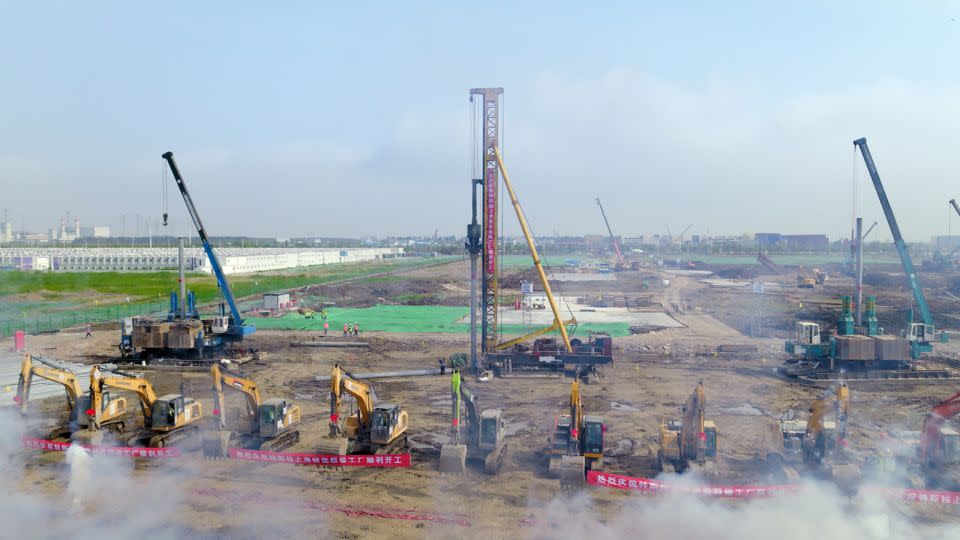Tesla is building a huge battery factory in Shanghai even as trade tensions rise

Tesla broke ground on a new manufacturing plant in Shanghai on Thursday, just weeks after CEO Elon Musk made a surprise visit to China in a bid to shore up the carmaker’s slumping sales.
The factory, which was announced in April last year, aims to begin production in the first quarter of 2025. It will be able to make 10,000 Megapacks — very large batteries used to store huge amounts of electricity — each year, according to a statement by Lingang Group, the government-owned developer of the area housing the plant.
The battery facility will be close to Tesla’s Shanghai Gigafactory, which is the company’s largest plant outside the United States, producing almost one million cars a year.
Megapacks are meant to be used to help stabilize energy grids. Each unit can store enough energy on average to power 3,600 homes for one hour, the company says. They are designed to be deployed by utilities and power stations.
The $200 million project comes as tensions between Beijing and Washington are rising over geopolitics and trade barriers, and underscores the US carmaker’s commitment to China, the world’s largest EV market and Tesla’s primary vehicle export hub.
“For Tesla, it’s an important milestone,” Tom Zhu, senior vice president of Tesla, was quoted as saying in an article posted on the Shanghai government website on Friday.
Rising tensions
While most Western companies are face rising barriers to doing business in China, things have been smoother for Tesla.
Shanghai said Friday it had taken both sides only a month to negotiate and conclude a deal to build the factory on the land near Tesla’s Gigafactory. The company was able to move similarly quickly when it built that first factory in 2019.
Wu Xiaohua, a Shanghai government official, said at the commencement ceremony Thursday that the city would assist Tesla in finishing the construction and putting the factory into operation “as soon as this year.”
Musk met with Chinese premier Li Qiang during his visit late last month. Li praised Tesla as a “successful model” for US-China collaboration.
Beijing has been ramping up efforts to accelerate EV production to counter a property-induced economic slowdown and promote a low carbon economy. But as domestic demand weakens, Beijing is also encouraging manufacturers to seek new growth opportunities in overseas markets.
That puts the industry at the heart of growing trade tensions with the US and Europe.
Earlier this month, President Joe Biden said that tariffs on $18 billion worth of imports of Chinese electric vehicles (EVs) and an array of other products would soar over the next two years.
EVs imported from China will see their tariffs nearly quadruple from 27.5% to 100%, a policy lever meant to challenge Beijing’s practice of encouraging aggressively low pricing by domestic EV manufacturers while levying a 40% tariff on US car imports.
The White House said the measures were designed to protect American workers and businesses in the face of China’s unfair trade practices, including “flooding global markets with artificially low-priced exports.”
Speaking in January, Musk said Chinese EV makers could put many of their rivals out of business unless tariffs were raised.
“Frankly, I think if there are not trade barriers established, they will pretty much demolish most other car companies in the world,” Musk told analysts on an earnings call.
At a tech conference in Paris this week, he struck a different tone, saying he was opposed to measures that distorted the market.
“Neither Tesla nor I asked for these tariffs, in fact I was surprised when they were announced,” Musk told VivaTech 2024 via video link, according to Reuters.
“Tesla competes quite well in the market in China with no tariffs and no deferential support. I’m in favor of no tariffs,” Musk said.
For more CNN news and newsletters create an account at CNN.com

 Yahoo Finance
Yahoo Finance 